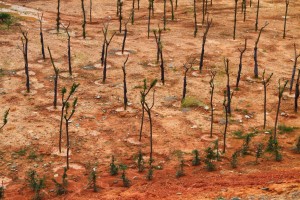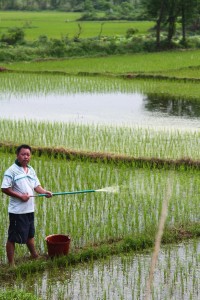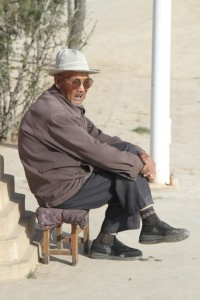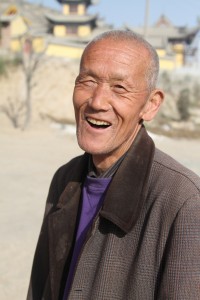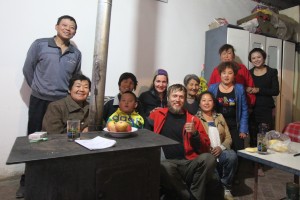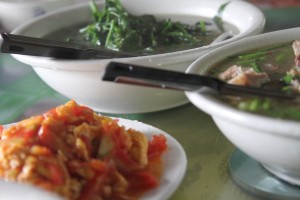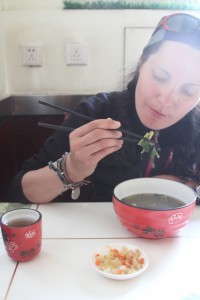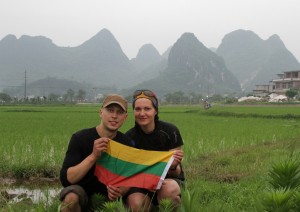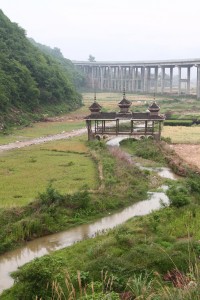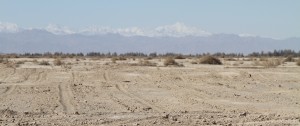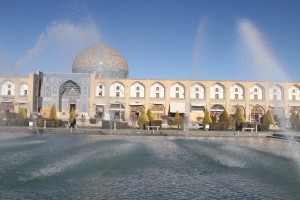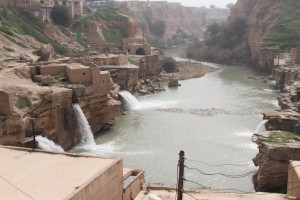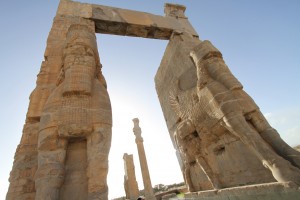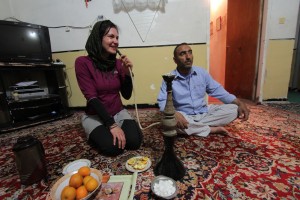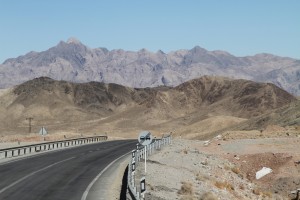China: people mad about health and diverse nature
We have crossed the gate of China with a slight thrill. Previous hitch hiking, hospitality and other rules may no longer be valid. With only ‘ni how’ (‘Chinese) and ‘she she’ (‘thanks’ in Chinese) in our language stores, we had no idea of upcoming events. Back in Lithuania some people were rather had no positive forecast for hitch-hiking in China. This surely sounded like a good challenge for us.
Journey through this land was a long meditation throughout nature diversity and city madness. Both newly built houses and shabby homes on poles were with elegantly raised roof endings, which is an ultimate Chinese signature. Cities and towns welcomed with either old fashioned blue-redish gates, or modern designed toll gates.
In the north west China is very similar to Kyrgyzstan. Later we fried in Gobi desert. In the mid of China we got surprised how inventive people were to use uncomfortable mountain spaces, turning them into fertile terraces. All of them were bright coloured and looked outstanding. Perhaps this land is the most beautiful in spring with cherry and apple trees in bloom. In south east we enjoyed karsted mountain in Guangxi region.
Finally when we thought to have said the final bye to the Asian hospitality back in Kazakhstan, in fact China again surprised us a whole lot.
In 3 weeks we have made 6.5 thousands of kilometres, though the journey did not seem to be long. Desert tornadoes and sand storms were replaced by fertile mountains and watery rice fields. When you get used to the jungle madness, the land suddenly turns into terra cota with tall and thin trees. Just after having crossed the border, we slept near the frozen lake with winter jackets, and in south east we struggled with humid heat and drank water like crazy.
China happens to be one the most progressive countries in the world. Having the biggest army, the second best economy, being the biggest exporter and none the less importer. Infrastructure grows here sharply, hence trucks form a non ending chain on the roads. The entire country like a big building site – just newly born skyscrapers and future roads and bridges. Wind mills, sun panels and dams producing electricity. Though the air is heavily polluted and majority of locals wear nose-mouth masks.
On the contrary, we have noticed plastic and quickly breaking trucks. Drivers were unhappy in struggling to change the gears or spending hours to fix vehicles on the road. And when you think, you came to a brand shop, it does not necessarily mean you will get quality goods. Familiar product names are changed very closely to those which we normally know. Crocs become croos, Rayban – Raybau, Monblanc – Montblonc, Adidas – Adibas, and Sony – Sonie. Does anyone really care about such minor errors?
People
When we say Chinese, we often think of Han ethnic group. But then we would need another 55 groups across China. In the west we still met uigurs – the Turkic group presenters. In the mid China, Linxia or otherwise called Chinese Mecca there are hundreds of mosques, which belong to Chinese Muslim Hui group.
In southern parts some women wore extremely colourful clothing and socks. Though differently from previous countries you can often see women in shorts or tiny skirts.
Giggling, polite and smiling, and always rushing to help you. Some time ago in Beijing I had a very unpleasant tea-scam experience, and took this pesky luggage with me. All this soon evaporated when we finally experienced tourist free, curious and friendly China.
Rarely our met Chinese knew English, but often they had some friends with some knowledge who helped us to explain where are we going. We had very positive acquaintances with policemen too. Some wanted to take pictures with us, hitching a bus for us, helping us with our luggage or supplying water for our journey.
Hospitality was very honest and not requiring any emotional reward. They did all from their hearts. Drivers always used to buy us water, ice tea, and often host us with dinner. One humble manager brought us home to have dinner. Soon he offered a hotel for us, which was a huge contrast with a previous night, where we slept in some neglected house with spiderweb curtains.
As we travel to off beaten tracks, people happen to be curious and turn back often to look at those strange travellers. Some came very close to observe how we fold our tent or boil water with hand made stove.
At first, you can think that Chinese are meek and self controlled. However, many of them were cheerful. Indeed, their body language is scarce, which was a big challenge for our communication. But at times they were even romantic or nostalgic. One truck driver for the fourth time was listening to beloved song and then singing loudly along. Then he called his partner to sing it over the phone.
Though spiting in public places something unique and universal. The government or business owners are ashamed of their citizens ill habits, hence you can see ‘don’t spit here’ signs or posters near schools teaching kids not to do it.
Once we have been hosted by a family too. When hopping up the terraced hills we tried to find a place to pitch a tent, we noticed some blooming cherry and apple trees up on the top. The scent of it lured us into wanting to sleep over there. But then some women worked in the garden. Even though neither we spoke Chinese nor them English, we managed to communicate a little bit, and soon those cheerful ladies invited us to stay with them. They surrounded us with care. Soon the neighbours came to look at new arrivals, and the father opened up a 14 year old bottle to host the guests. They gave their own bed to sleep, whilst the entire family slept in one bed.
In the morning we had a great temples on the hill tour. Those who look after the temples presented us with fruits from the altar. We said goodbye to the family as old good friends. Back on our road we were thinking that if we did not climb up curiously up the hill, we certainly did not have such a lovely local people experience.
Health
Eastern medicine gets his fame in the western world too as an alternative way of healing or prophylaxis. They look after their health intensively. One morning in Urumqi we went to have a stroll in People’s Park. The sun was rising, and no matter how old people were exercising in one or the other eastern way. No matter how strange they performed, nobody really cared of each other. We were the only spectators of the show.
Later the park got filled with dancing in eastern or western way personas despite the fact it was a working day.
All of them drink green tea or hot water. There are tons of health products stores and even hospitals. In one of them we bought our maliaria tablets, or better to say some bags with powder. Apparently they are natural products, so we were lucky enough to get something natural instead of damaging our organisms with chemicals. But then we experienced something a bit unpleasant and a bit uncomfortable, and that is – side effect. Once you eat one type of powder, that day you will want to go to toilet annoyinlgy often. And no waiting time is allowed. If you are by any chance in the car, you cannot wait to reach the destination. You really need to stop right here and right now. The positive thing is that usually you feel ok and you can eat everything as usual.
In the shops you can see all sorts of flip flops with some bumps to press the right foot place so you would become healthy. Once we met a manager of a furniture factory. He showed us around his very tidy plant, and explaining about the products he was so proud of a raw material that they were using to produce the items. ‘It’s a camphar tree’ he have us to scent it. The wood smelled pleasantly, but what was more important for the manager that this wood was healthy.
The food was mostly healthy too. Lots of veggies (so our organisms got back to their normal status after the meat slavery in Kyrgyzstan). We have tried some balsamic pear (bitter, but again – super healthy) or meri fruits. The truck drivers beside their usual sunflower seeds bite betel nut. At first it gives you a pleasant chill in your mouth. Then it forms some strange lump deep in your mouth.
Hitch hiking
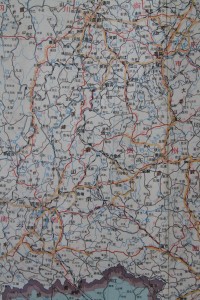
Tranzavimas nelengvas - nuolat bekintanti kelių raizgalynė. | The hitchhiking was not easy - ever changing road jungles.
To stop the cars in China is very easy. Maybe truck drivers were reluctant to stop however they always curiously observed nearly dropping out of the vehicles. Though the hardest job followed after the car stopped. We only knew few mere phrases, and their gestures are no way even close to those of Iran or Turkey. Hence there was one big challenge to explain where we are going. Sometimes they try to explain it twice – in other maybe easier Chinese words. But that did not help us at all.
China has 1.4 billion inhabitants. The desert and mountains are uninhabited, leaving some parts of China hugely populated. Even ‘small’ city could easily race with some countries capitals. So walking through some of thouse cities is a painful experience.
It is one of the most progressive countries, whose infrastructure grows rapidly. Hence if you think you have 2008 map and it will be ok to use it, forget it. Even 2010 cannot reflect all of the highway systems. This country is a true beast.
Nature
Traveling from one region to the other it seemed like going from one country to the other. Tian Shan in the very west part, then the heat of the Gobi desert. Sometimes the mountains appeared from nowehere with their snowy caps. In some places sand whirpooled into small tornados. Then we met sand storm which covered cars in a thick layer.
Sometimes getting lost may bring some use. One our driver was extremelly unfocused – on the way he even managed to hit the motorcycle driver. Luckily, the victim got up, hence the car owner got out of situation just paying him some money. He was obviously in hurry, so hastily was running up and down the hills roads. The views were magnficent – terraced mountains in the background of the lake. However, the road was wrong so the guy needed to reverse. Another road ended up with a ferry over the lake. We were happy – free ride from one Liuijiaxia reservoir side to the other.
Non – highway roads were the best to feel connected with the nature. Hundrends of kilometres we lived the river life. We woke up and went to sleep near it. The mountains and valleys were breath taking, some of them even taking us back to the Scotland memories. Some drivers had a great music taste, so our journey was accompanied by soft and melodic chinese tunes.
We also visited tourist beloved Guangxi region with karsted mountains and jungles. Fortunately managing to find picturesque places with no people around was the best experience. Otherwise we feel that such places are not for us anymore. We need people without masks, and even simple beauty has its own pearls.
Sleep
Couchsurfing (www.couchsurfing.com) is not popular at all, so the next three weeks were mainly slept in the nature. Sometimes we found quite interesting places to rest like bridge-temple, or temples somewhere in the mountains, in the corn fields or neglected houses, near the rivers or in the building sites.
On the way to Laos
We thought to reach Laos that morning, but when we brushed our teeth in our sleeping place near the jungle, some young people drove past and stopped to have some rest. After hearing our story, they took us to give a lift and on the way invited us to an elephant reservoir. We haven’t seen elephants that day, but from the cabins above the jungle we meditated the beauty of the leafy forests. After having had a delicious dinner with our new friends, we reflected if we could have afforded such detour ourselves, whether we would have appreciated the experience that much.
We left China with hundreds of great memories and positive feelings. On the way to Laos.
Iran: veiled women, open-heart-housed people, and picturesque nature
Before entering Iran we had a bunch of warnings from our relatives. The media has mainly focused its attention on recent relationships between Iran, Israel, Europe and States. It is almost everything been so fragile and on the verge of a newly upcoming war.
Though whilst we are on a go, it seems another kind of regime switches on. We rarely access the TV, the Internet is being used in a rush to update what we have been up to. Even though somewhere at the back of one’s mind the news exists, we enter this country as any other place. So standing between the borders of Turkey and Iran, we were happy to finally having obtained our visa, and looking forward what this country could offer us.
Once anyone in Turkey has heard we are about to go to this Islamic republic, immediately they showed I will have to wear a headscarf. Thirty years ago the Islamic revolution has left women with no choice about it. The religious regime has come to power, and regulations have been observed by a strict religious police. No alcohol or partying aloud, no inappropriate touch or touch between men and women at all.
Ironically in no-man-land the path was covered with the pages full of porno photographs, torn and freely flying around, been blown by the wind. Meanwhile I fixed my hood to avoid the mistakes during our first steps in the country under the thick veil.
We have been advised that hitch hiking in Iran is simply unknown of, and it will be a big challenge for us to move forward following the principles of what we call now our lifestyle for this journey. Indeed the first steps in Iran had not much difference than other countries – the money changers in low voices offering us a good deal, followed by a crowd of what have recently named as hyenas. Taxi drivers were cooled down quickly after our final proposal for giving us a lift. ‘For free’ or not at all. One smarter one has followed us and like an ally smiled at us: no money – no problems. We sat down taking his words for truth. As the kilometers run through he suddenly could not believe we could not offer him 15 dollars for the ride. We were strict about it – there will be no money, so he better let us out here.
After slightly unpleasant experience we decided to stop the trucks, which in our experience have never let us down. Soon one has stopped, and we got with him very far.
Shortly we have been stopped at the usual police check. The policemen were about to let us away till one has thought to make a thorough check of my bag. Karolis has brought it to the office, and the man in dark green started to scrutinize my belongings. After opening the washbag full of clearly female stuff, he needed the owner to proceed. Once I got into the cabin-like office, he clearly needed Karolis again as the male on his own cannot talk with a female.
After having found nothing of major importance, they let us go. Very soon quite a few men hopped on the highway, waiving their hands. The driver understood the trick, and made a sharp turn. Soon the liquid from plastic containers went down the hungry truck’s mouth. It seems the fuel for the trucks is not accessible as you would expect in the country full of oil. The big vehicles queued in some (as you cannot get in every) garages. Still hungry car’s stomach soon showed severe signs, and the driver has seriously started to worry. ‘If we find the fuel, we will be in Teheran after midnight. If no – no idea when’ his concern grew. His joy of finally finding one offering him necessary ‘car food’ was possible to understand.
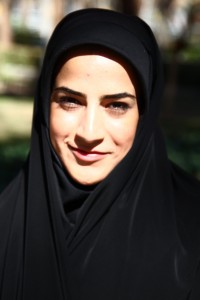
Chaddar (palapinė iran.) - pagrindinis Irano moters rūbas. | Chaddar (tent - Iran) - dress codes in Iran.
We reached early suburbs of Teheran well after midnight. And stood right on the track early morning, where the road was overfilled with rushing to work cars. Hitchhiking was close to impossible. One car though stopped, and after agreeing a clear price of ‘no money’ he appeared as he would be heading to work and giving us a lift on a way. Surprisingly he asked whether we have friends and was ‘too kind’ in trying to find the place where our couchsurfers lived. We finally asked him to bring to internet cafe, and he followed us to the end then announcing he wants some money for this. We had to be strict in reminding him of what has been agreed. That was a good sign for us that we need to be even clearer about hitchhiking rules. In fact, Karolis soon has learned ‘pul nedera’ (no money (ir.)) phrase, and I decided to stay away from this clearly male bargaining play.
Teheran
The public transport was a fresh experience. We soon had to split up in two – female and male – waiting areas. Buses were divided into two sections too. One for women; and no man should enter it. Once a man tried to get in as the male section was clearly full, and he got shouted at for perhaps being rude and daring to do such a nasty thing. He got out quickly, whilst a young woman has been mumbling about ‘an accident’ for quite a few stops.
I have to share my female experience leaving Karolis with his own. Once I entered the bus, I just felt so wrong being in this ship full of dark dresses and soft voices. I was a head taller than any of them, and my traveler boots, pants and a hoody looked no way elegant in comparison with their very female coats and dresses. I still had no skirt over my trousers; hence the looks have been running up and down my attire by curious and a bit judgmental eyes. After the firsthand panic has passed, I finally wanted to see the eyes of those women, who have been forced and perhaps got used to what is so unusual in the west. I thought and eventually got my idea confirmed by Nahid, our new Iranian friend: if the restriction of veils has been canceled, a lot of women would look no different from the western counterparts. Some faces were covered by full make up, their scarves showed at least half of their hair. Some clothes were extremely elegant and revealing subtly their female curves.
On contrary some either young or old have been covered fully in chadras. Some elder ones were holding the corner of the material in their mouth, and this daily yearly action eventually shaped it unevenly. It feels that those women obey to rules kindly, and would be strict educators to other rebels.
Very soon we exchanged smiles and started to converse with some students. They cheerfully welcomed me to Iran and were happy to share a fact or two about themselves. It turned into a routine: in at least every second bus women started to chat with me, talking about books and films, or the situation in Iran.
Once the rules are overly strict, there are always those who try to get away subtly or openly. We soon started to observe the rebels – some couples holding hands, two lovers talking over the doors dividing two parts of the bus, softly touching each others hands. They are lucky not to be caught by religious police, who would interrogate them what their behavior is supposed to mean. Some lie about being siblings, but the truth can quickly be revealed after their identities had been checked.

Teheran did not look very appealing though. The traffic was awful, and it took as a good ‘two hour’ public transport experience to get from one end to another. There were no cozy corners apart from some parks to hang out. According to our host Sharooz, young people do not have so usual to westerners’ way of chilling out. Some do sports, some play computer games. There are no Hollywood films in cinema, and surely no scenes of sex or even kissing in any of their films. Illegal copies of films are very common, and people are quick to exchange any other media too. Even though Facebook, Youtube or other popular sites been band in Iran, people know their ways around to get rid of such restrictions.
Esfahan
This city which some time ago was a capital been recommended by nearly every met Iranian. It surely met and outgrew all our expectations. Arched bridges, Imam’s square the size wise competing only with Tiananmen Square in Beijing and parks seated with chill out people. The sunny weather added a flavour, and altogether it created a superb atmosphere one wants to hold on.
Upon our arrival with VIP bus – [it seems hitchhiking got another dimension in Iran. People demanded to buy us tickets, and we combined it with a usual way of autostop] – just after the midnight, we planned to pitch the tent somewhere in the park. One taxi driver caught our attention by a very kind way. He firstly offered us a free lift to the needed place, then inviting us to his home.
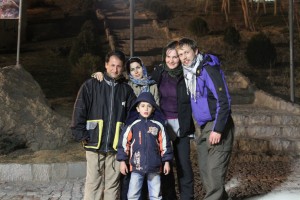
us priglaudusi šaima ir jos taip seniai lauktas pasivaikšiojimas parke (daug dirbantys žmonės). | Our super wonderful hosts and their long waited walk in the park (hard working people).
So the next day we had a backpackfree walk in the town, fully immersing to the atmosphere. Some people like Ali Shariati, a nice guide that we met in Imam Square (mob. +9131036243), were trying to help us out looking for sceenic places while other ones were just currious and wanting to exchange some few English phrases they knew. At night we got back for the lovely dinner, and soon we were surprised by Ibrahims and Sarit’s inner strength which they had to demonstrate throughout their lives. It seems all the puzzle parts of ‘why these peoople appear to be so wise and goodhearted’ came to the right places. Their stories inspired us.
Sarit and Ibrahim have been enjoying their 13month old marriage, and 9 year old Mohamet Reza was Sarit’s son from the previous marriage. She had to go through an awful process of divorce as she could not stand her husband’s oppression and drug related health issues. In Iran the divorce outcome always will be positive to father’s side. Hence Sarit had to stay strong and go through numerous court cases in order to retain her son with her. Being from a small village she indeed had to have a lot of patience to fight against.
We had been thankful to hear their stories, and certainly wish much strength for their family as it seems the process has not been over yet.
Sushtar
To get into Shushtar via mountains we had no chance once again. The same old tune: ‘the road has been snowed in’. The village taxi driver and his friend law teacher had not wanted to leave us hitching. They brought us to their friend’s home, tea’ed us down and bought us the ticket to Shush.
We arrived at 4am in the morning, and the driver saw us wanting to go and pitch the tent somewhere, as we shushed all the taxi drivers and hotel client hunters. As an old friend he winked his eye and soon we found ourselves in the basic room where normally drivers take the nap after the night drive.
Shushtar has an atmosphere of sand like houses with the river calmly flowing in the very heart of it. The old man Iranian voice seemed to follow the stream reaching the flat roof tops and up the hill coming to calm our ears and minds. We could have been sitting there and gazing over the town.
One of first hydraulic systems in the world were picturesque. It was full of school girls coming for a school tour to learn something about it. As soon as they noticed us, they could not help but coming and asking where we are from, asking to take a picture together and simply befriending us in like 10 seconds. The abundance of such attention was overwhelming.
Shiraz and Persepolis
Shiraz has been in top 2 list of people’s recommendations competing with Esfahan. It definitely had its own atmosphere. The parks with people chilling out; the Quran gate with the waterfall and the stairs seated by a variety of people; the sunset. It all left us with a pleasant taste of it, however Esfahan was still a number one.
Nahid – a young Iranian woman – shortly after a conversation, was surprised we are going to camp in ‘such weather’. Obvious plus-temperature was no obstacle for us, moreover the night before we slept under the bridge, when the bus arrived to town in the early morning. However, we accepted kind offer, and soon we were eating her mom’s prepared fish and rice. It seems Iranian hospitality went way beyond our expectations.
Persepolis, a short distance from Shiraz, has welcomed us with afternoon sun warmth. The ruins of a long time ago great city still somewhere witnessed majesty. We were climbing up the stairs, perfectly built for slow walking up whilst bearing gifts to the king and having elegant conversations. Imitating that graceful pace, we added a missing column or two, and soon our imagination filled the ruined city with some life in it. The beauty of walls with carved out lions or gift bearers could portray that time atmosphere. We climbed a little higher on the hill, and overlooked the well designed some time ago to-be-imagined buildings and courtyards. There were some oddly shaped mountains in the distance, and we gazed at the beauty for some time.
A night in the village of the desert
Walking through the rice fields, we got back on the road that led through the valley separating mountains. We hitched few cars when the sun set down and we thought to call it off. Meanwhile one car stopped, and a loud speaking man with his even louder wife has jokingly or seriously argued over something. At the same time we tried to explain where we are heading to. ‘Yazd? Yazd?’ he kept repeating to us and then showed his car to get in. We noticed soon that he drove off the main road. ‘Farda Yazd’ he was laughing (tomorrow Yazd), and in no time we appeared in their home. The main room as so the others were carpeted with no more than a TV set. No cupboards or sofas, just few pillows to make the floor seating more comfortable. A usual routine – tea followed by a deliciously cooked meal. His second son came back home, and soon the water pipe once again gathered us in the circle. Everyone apart the mother was smoking, and I as so called ‘man of honour’ have breathed in quite a few apple scented smokes.
So here we were, picked up from the road, all washed up and clean, fed and happy, slept like babies. The next morning back on the road – he hitched a truck for us, and gave some money in. That’s the Iranian hospitality.
Mashhad
The road through the desert from Shiraz to Mashhad was straight bouncing off to the mountains at the end of it. After some spices-like layered mountains the desert revealed another kind of sand again. Some tiny bushes were rolling over the road as the wind played it cheerfully.
The city was needed for us to obtain the visa to Turkmenistan, as it was closer to the border. We could order it in Teheran consulate and collect it on our way up to the North. Disappointingly we only got it for 3 days which only meant we have to rush it through.
The second biggest city though felt far more religious than any other ones. No surprise, the Imam Mohamed Reza mosque complex invites millions of pilgrims each year not only from Iran, as well as some Shia Muslims from Iraq or other Arab countries. The entries were separate for ladies and gents, an elderly woman asked me whether I am Muslim. No intention to lie, so direct answer ‘I’m only a tourist’ surprised them. Moreover, with my scarf and not too long skirt over my trousers – I looked to them and actually felt like I was naked. They ordered me to go back and find a chadra. One of the officers ran to the shop and bought me a brand new one. We were presented with a volunteer guide, who proceeded us to the museum and then the actual complex. The site was majestic, and the intensity of human traffic was huge. We could barely imagine the festive scenery here – the crowds of people coming to pray and pay honour to the Imams.
Our guide invited us to his home for a night stay, and soon we appeared in his father’s house with a huge family weekly gathering. The family of 5 siblings eventually grew bigger with the spouses and kids, and it gave an impression of a busy place. Another Iranian family experience. It seems that the hospitality just hit the roof of our personal country scorings -Iran certainly got the highest marks in our country experience.
It is so sad, that the government creates such an awful image of the country, whilst the inhabitants are the loveliest, the most hospitable people ever.
Back on track to the next country in three days – Turkmenistan.

